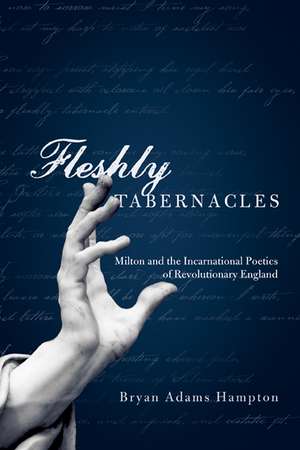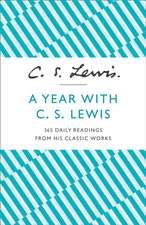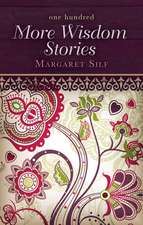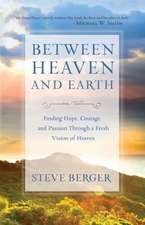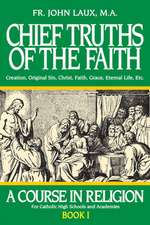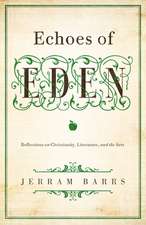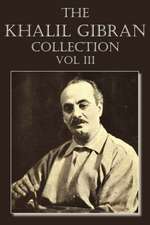Fleshly Tabernacles – Milton and the Incarnational Poetics of Revolutionary England
Autor Bryan Adams Hamptonen Limba Engleză Paperback – 14 noi 2012
In Fleshly Tabernacles, Bryan Hampton examines John Milton’s imaginative engagement with, and theological passion for, the Incarnation. As aesthetic symbol, theological event, and narrative picture of humanity’s potential, the Incarnation profoundly governs the way Milton structures his 1645 Poems, ponders the holy office of the pulpit, reflects on the ends of speech and language, interprets sacred scripture or secular texts, and engages in the radical politics of the Civil War and Interregnum. Richly drawing upon the disciplines of historical and postmodern theology, philosophical hermeneutics, theological aesthetics, and literary theory, Fleshly Tabernacles pursues the wide-ranging implications of the heterodox, perfectionist strain in Milton’s Christology. Hampton illustrates how vibrant Christologies generated and shaped particular brands of anticlericalism, theories of reading and language, and political commitments of English nonconformist sects during the turbulent decades of the seventeenth century. Ranters and Seekers, Diggers and Quakers, Fifth monarchists and some Anabaptists—many of those identified with these radical groups proclaim that the Incarnation is primarily understood, not as a singular event of antiquity, but as a present eruption and charged manifestation within the life of the individual believer, such that faithful believers become “fleshly tabernacles” housing the Divine.
The perfectionist strain in Milton’s theology resonated in the works of the Independent preacher John Everard, the Digger Gerrard Winstanley, and the Quaker James Nayler. Fleshly Tabernacles intriguingly demonstrates how ideas of the incarnated Christ flourished in the world of revolutionary England, expressed in the notion that the regenerated human self could repair the ruins of church and state.
“Bryan Hampton’s book makes an original and important contribution to the field of Milton studies, as well as to the study of seventeenth-century radical English religious thought. His work has further implications for the study of comparative hermeneutics, proposing provocative continuities and correlations between medieval and early modern approaches to interpretation on the one hand, and contemporary theories of language and meaning on the other. Exhaustively researched and meticulously annotated, Hampton’s readings of incarnational epistemologies offer a wealth of insights and suggestive parallels among early modern writers who are not often taken together.” —Jeffrey Spencer Shoulson, University of Miami
| Toate formatele și edițiile | Preț | Express |
|---|---|---|
| Paperback (1) | 361.73 lei 6-8 săpt. | |
| MR – University of Notre Dame Press – 14 noi 2012 | 361.73 lei 6-8 săpt. | |
| Hardback (1) | 698.37 lei 6-8 săpt. | |
| MR – University of Notre Dame Press – 14 aug 2022 | 698.37 lei 6-8 săpt. |
Preț: 361.73 lei
Nou
Puncte Express: 543
Preț estimativ în valută:
69.22€ • 72.46$ • 57.27£
69.22€ • 72.46$ • 57.27£
Carte tipărită la comandă
Livrare economică 05-19 aprilie
Preluare comenzi: 021 569.72.76
Specificații
ISBN-13: 9780268030964
ISBN-10: 0268030960
Pagini: 386
Dimensiuni: 159 x 231 x 31 mm
Greutate: 0.58 kg
Ediția:1st Edition
Editura: MR – University of Notre Dame Press
ISBN-10: 0268030960
Pagini: 386
Dimensiuni: 159 x 231 x 31 mm
Greutate: 0.58 kg
Ediția:1st Edition
Editura: MR – University of Notre Dame Press
Notă biografică
Bryan Adams Hampton is the Dorothy and James D. Kennedy Distinguished Teaching Associate Professor of English at the University of Tennessee at Chattanooga.
Descriere
In Fleshly Tabernacles, Bryan Hampton examines John Milton’s imaginative engagement with, and theological passion for, the Incarnation. As aesthetic symbol, theological event, and narrative picture of humanity’s potential, the Incarnation profoundly governs the way Milton structures his 1645 Poems, ponders the holy office of the pulpit, reflects on the ends of speech and language, interprets sacred scripture or secular texts, and engages in the radical politics of the Civil War and Interregnum. Richly drawing upon the disciplines of historical and postmodern theology, philosophical hermeneutics, theological aesthetics, and literary theory, Fleshly Tabernacles pursues the wide-ranging implications of the heterodox, perfectionist strain in Milton’s Christology. Hampton illustrates how vibrant Christologies generated and shaped particular brands of anticlericalism, theories of reading and language, and political commitments of English nonconformist sects during the turbulent decades of the seventeenth century. Ranters and Seekers, Diggers and Quakers, Fifth monarchists and some Anabaptists—many of those identified with these radical groups proclaim that the Incarnation is primarily understood, not as a singular event of antiquity, but as a present eruption and charged manifestation within the life of the individual believer, such that faithful believers become “fleshly tabernacles” housing the Divine.
The perfectionist strain in Milton’s theology resonated in the works of the Independent preacher John Everard, the Digger Gerrard Winstanley, and the Quaker James Nayler. Fleshly Tabernacles intriguingly demonstrates how ideas of the incarnated Christ flourished in the world of revolutionary England, expressed in the notion that the regenerated human self could repair the ruins of church and state.
“Bryan Hampton’s book makes an original and important contribution to the field of Milton studies, as well as to the study of seventeenth-century radical English religious thought. His work has further implications for the study of comparative hermeneutics, proposing provocative continuities and correlations between medieval and early modern approaches to interpretation on the one hand, and contemporary theories of language and meaning on the other. Exhaustively researched and meticulously annotated, Hampton’s readings of incarnational epistemologies offer a wealth of insights and suggestive parallels among early modern writers who are not often taken together.” —Jeffrey Spencer Shoulson, University of Miami
